Introduction
Hormone Replacement Therapy (HRT) is a medical treatment used to replace hormones that are at a lower level due to ageing or health conditions. Many people seek out HRT as a way to manage symptoms of menopause, thyroid disorders, and other hormonal imbalances. However, there has been significant debate on whether HRT is truly a lifesaver or a potential risk factor for different health issues.
In this article, we will explore what HRT is, its various types, the benefits and risks associated with it, and whether it’s the right choice for you. Whether you are considering hormone replacement therapy for menopause, thyroid hormone replacement therapy, or looking for natural hormone replacement options, this article will help you make an informed decision.
What is Hormone Replacement Therapy (HRT)?
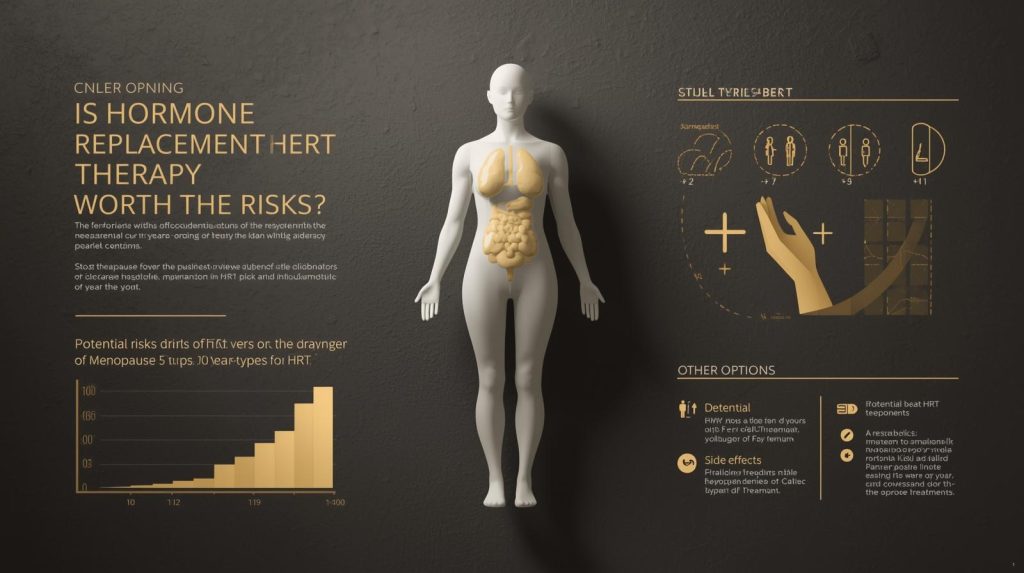
Hormone Replacement Therapy (HRT) involves taking hormones to replace those that are either not being produced in sufficient quantities or are being imbalanced due to age or other health factors. Typically, women seek HRT during menopause, while men may need it for testosterone imbalances or other hormone deficiencies.
HRT can help improve symptoms such as hot flashes, mood swings, and fatigue, which are associated with a decrease in hormones like estrogen and progesterone in women, or testosterone in men.
Types of Hormone Replacement Therapy
HRT comes in different forms depending on the type of hormones being replaced and the person’s specific needs. The most common types include:
- Estrogen-only therapy: This is for women who have had a hysterectomy (surgery to remove the uterus). If a woman takes estrogen alone, it can increase the risk of cancer of the uterus. Since these women no longer have a uterus, that risk is gone. For them, estrogen-only therapy has a lower risk of breast cancer.
- Combination therapy (Estrogen and Progesterone): This is for women who still have their uterus. It includes both estrogen and progesterone. The progesterone protects the uterus from cancer. This is the type that has a small increased risk of breast cancer with long-term use..
- Testosterone replacement therapy: For men with low testosterone levels.
- Thyroid hormone replacement therapy: This is a different kind of treatment. The thyroid gland is located in your neck. It makes hormones that control your metabolism. If your thyroid is underactive, you may experience fatigue, weight gain, and a tendency to feel cold.
- Thyroid hormone replacement therapy gives your body the thyroid hormone it needs. Unlike the debate around Hormone Replacement Therapy for menopause, thyroid replacement is usually considered essential and life-saving for people with an underactive thyroid. The risks are much lower when the dose is correct.
Benefits of Hormone Replacement Therapy
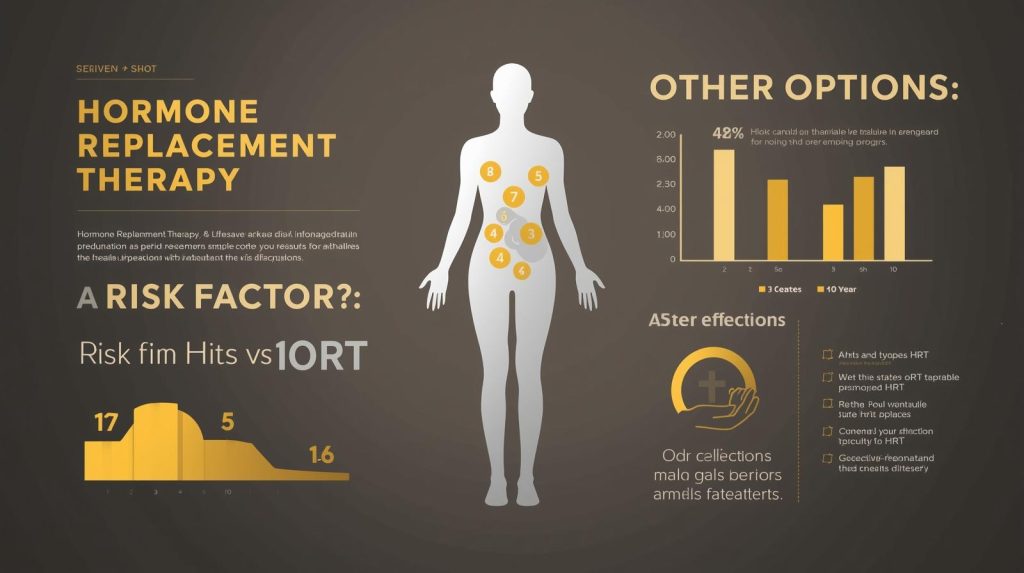
1. Relief from Menopause Symptoms
One of the most common reasons for starting HRT is to alleviate symptoms associated with menopause. These symptoms include:
- Hot flashes
- Night sweats
- Mood swings
- Vaginal dryness
- Sleep disturbances
Estrogen is the primary hormone used in HRT for menopause, as it helps to regulate the body’s temperature and improve skin moisture and elasticity.
2. Bone Health
As estrogen levels drop, women become more susceptible to osteoporosis. HRT can help prevent bone loss, reduce the risk of fractures, and improve bone strength. In some cases, hormone replacement therapy for menopause has been shown to increase bone density.
3. Heart Health
Estrogen is known to help protect the heart by improving cholesterol levels and maintaining the health of blood vessels. HRT can, therefore, reduce the risk of heart disease when started at the right time. However, the window of opportunity is crucial, as starting HRT too late may yield fewer benefits.
4. Improved Mood and Mental Health
Low hormone levels can contribute to feelings of sadness, irritability, and anxiety. HRT can help improve mood and mental clarity by restoring hormonal balance, offering relief for people who suffer from depression linked to hormonal imbalances.
5. Skin Health
Estrogen also helps maintain skin elasticity and hydration. By boosting estrogen levels, HRT can improve skin texture and reduce the appearance of wrinkles, resulting in healthier, more youthful-looking skin.
Risks of Hormone Replacement Therapy

Despite its numerous benefits, HRT carries potential risks. Some of the most commonly discussed risks include:
1. Increased Risk of Cancer
There is some evidence to suggest that long-term use of combination HRT (estrogen and progesterone) may increase the risk of breast cancer, ovarian cancer, and endometrial cancer. However, the risk is dependent on the type of therapy, the duration of use, and other individual factors.
2. Blood Clots and Stroke
HRT, particularly oral estrogen, has been linked to an increased risk of blood clots. These clots can lead to strokes or deep vein thrombosis (DVT). The risk is higher for people who smoke, have high blood pressure, or are over the age of 60.
3. Heart Disease
While estrogen has heart-protective properties, starting HRT later in life (after the age of 60) may actually increase the risk of heart disease. This is especially true for people with preexisting heart conditions. It’s essential to discuss the risks with your healthcare provider.
4. Gallbladder Disease
Estrogen therapy can increase the risk of developing gallstones and other gallbladder issues. People with a history of gallbladder disease should consider this risk before starting HRT.
5. Weight Gain
Some people report weight gain while using HRT. This is mainly due to water retention or changes in metabolism. However, this side effect is not universal and varies from person to person.
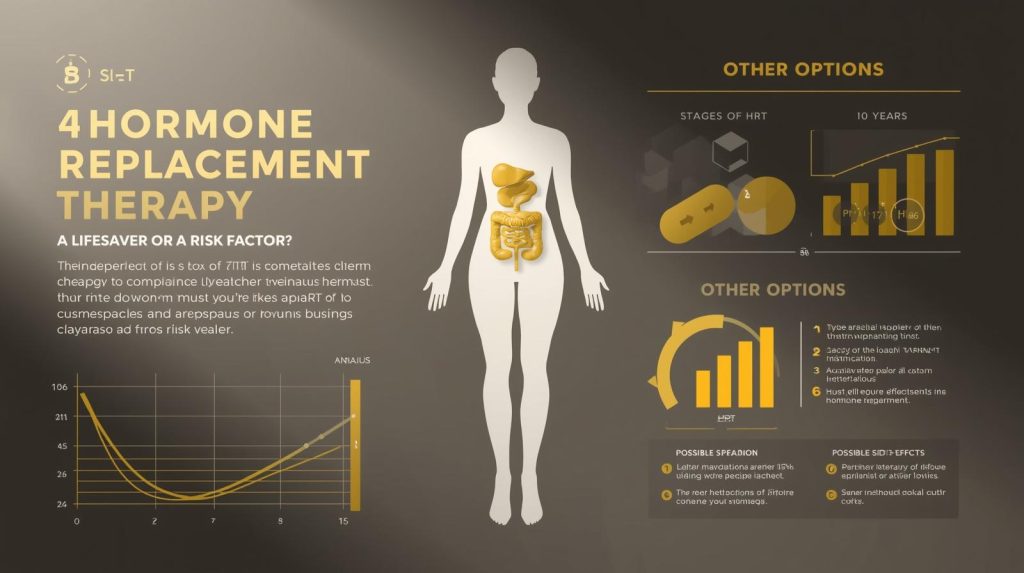
Hormone Replacement Therapy for Men
Hormone replacement therapy is not only for women. Men also face hormonal imbalances as they age, especially low testosterone levels. Testosterone replacement therapy can help men regain energy, improve libido, increase muscle mass, and alleviate symptoms of low testosterone, such as depression or irritability.
However, testosterone replacement therapy also carries risks, including the potential for prostate issues, cardiovascular problems, and liver complications. Men need to have regular check-ups and discussions with a doctor before starting therapy.
Natural Hormone Replacement Therapy: Is It a Better Option?
Many women look for “natural” ways to manage menopause. The term “natural” can mean two things:
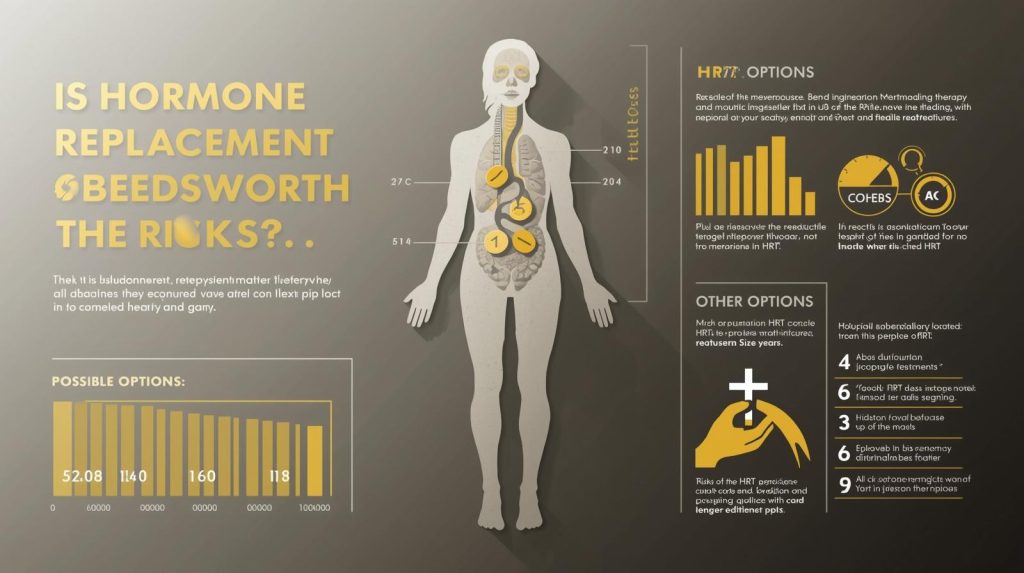
Herbal Supplements: Some women try supplements like black cohosh or soy isoflavones. It is essential to recognise that “natural” does not always equate to “safe.” These supplements are not regulated like medicines. They might not work, and they could interact with other medicines you are taking. Always talk to your doctor before starting any supplement.
Lifestyle Changes: This is the safest option. It includes eating a healthy diet, exercising regularly, managing stress, and limiting consumption of caffeine and alcohol. These things can help with mild symptoms.
Hormone Replacement Therapy Near Me: Finding a Doctor
If you are thinking about Hormone Replacement Therapy the most crucial step is to talk to a good doctor.
How do you find one?
Choose a doctor who listens to you. They should clearly explain the benefits and risks. They should help you make a personal decision.
Ask your primary care doctor for a recommendation.
Look for a gynaecologist or an endocrinologist. These doctors specialise in women’s health and hormones.
Search online for Hormone Replacement Therapy near me and read reviews.
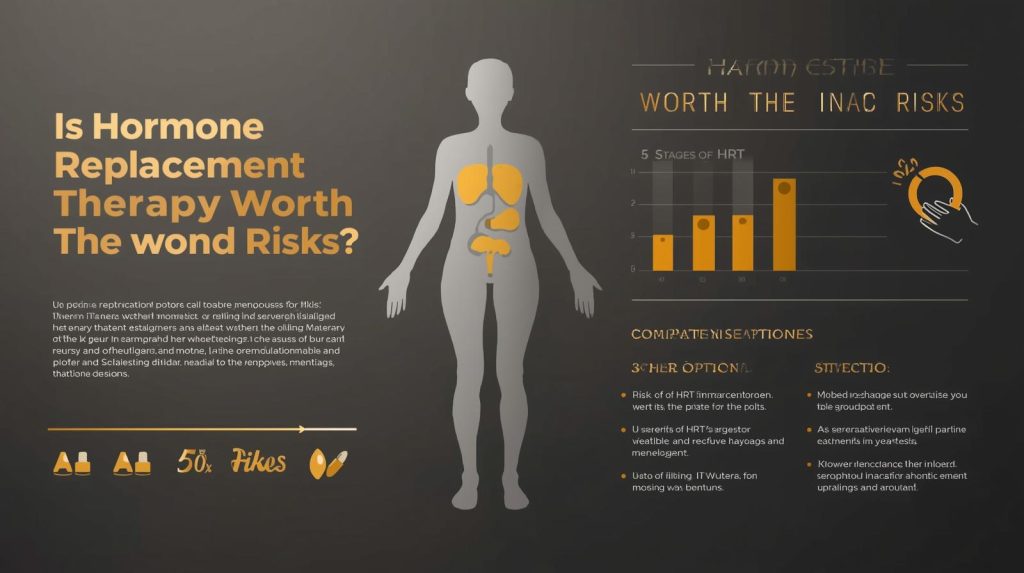
Frequently Asked Questions (FAQs)
1. What are the signs that you need hormone replacement therapy?
Common signs include hot flashes, night sweats, mood changes, vaginal dryness, and sleep issues. If you experience any of these symptoms, it’s worth consulting a doctor about HRT.
2. Is HRT safe for everyone?
HRT is not suitable for everyone. Women with a history of breast cancer, blood clots, or certain heart conditions may not be good candidates. Always consult a healthcare provider before starting HRT.
3. Can men benefit from hormone replacement therapy?
Yes, men with low testosterone can benefit from testosterone replacement therapy. It can help increase energy, libido, and muscle mass.
4. How long should I stay on hormone replacement therapy?
The duration of HRT depends on individual factors such as your symptoms and overall health. Some people use it for a few years, while others may continue using it for more extended periods. Your doctor will guide you based on your needs.
5. Are there risks to using hormone replacement therapy for menopause?
Yes, risks include increased chances of blood clots, stroke, and some cancers. The benefits of HRT for menopause should always be weighed against these risks.
Conclusion
Hormone Replacement Therapy (HRT) can be a lifesaver for many individuals dealing with hormonal imbalances, especially during menopause or due to thyroid issues. It offers relief from many uncomfortable symptoms and can improve the quality of life. However, it’s essential to be aware of the potential risks, including an increased likelihood of certain cancers, blood clots, and cardiovascular issues.
Before starting HRT, it’s crucial to consult with a healthcare provider who can help assess your individual risks and benefits. Whether you’re considering HRT for menopause, thyroid hormone replacement therapy, or exploring natural hormone replacement options, understanding the whole picture is essential for making the best choice for your health.
Hormone Replacement Therapy: A Lifesaver or a Risk Factor? The answer ultimately depends on your unique health needs and circumstances.
Only you and your doctor can answer that. Be informed. Ask questions. And choose the path that helps you live your healthiest, happiest life.

Pingback: Signs of Heart Attack in Women: How to Spot Them Early-2025